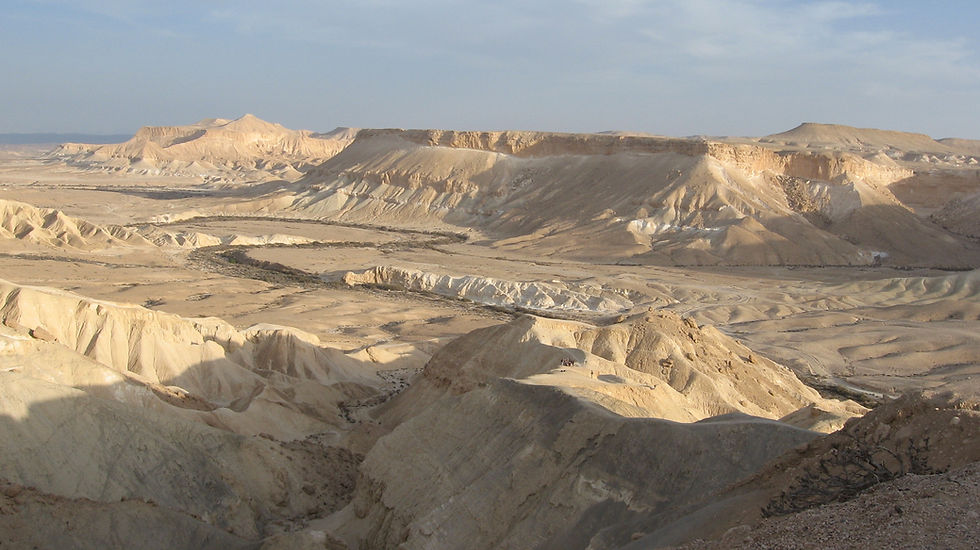Bamidbar. Why a Wilderness?

This week we begin Sefer Bamidbar – “In the Wilderness”. We began our national existence in this rugged and harsh environment. There we received the Torah. Why there? Why in a wasteland? Why not in the land of Israel? Or maybe even in Egypt?
So please discuss:
Why are the Jewish people “born” in the wilderness and not within a civilization like Canaan or Egypt?
The Torah is given in the wilderness. Can you think of a good reason why?
Jeremiah complained about the corruption in Jerusalem. He stated “ Oh, to be in the desert, at an encampment for wayfarers! Oh, to leave my people, to go away from them— For they are all adulterers, A band of rogues.” (Jer 9:1) What is the wilderness about for Jeremiah? Might this explain why Israel is formed and why the Torah is given in the wilderness?
What do you feel when you encounter a “midbar,” a desert or a harsh hostile territory? Is it a place which is welcoming? Inspiring? Lonely? Frightening?
Here are a few approaches to think about:
1. Free and Open
“Anyone who fails to make themselves free and open [lit. Hefker] like a wilderness cannot acquire the wisdom of Torah – hence its states: ‘In the Wilderness of Sinai.”
The wilderness represents simplicity, humility. Torah is given in a place of simplicity. The hauty cannot accept God’s lifestyle imposed upon them. There is a Midrash that Mount Sinai was not the most impressive or imposing mountain, but rather the most humble of mountains. When I am in the wilderness, not surrounded by creature-comforts, I am more open to my surroundings, but most importantly to myself.
How do we “open” and “free” ourselves to allow Torah to enter?
2. A second approach. The wilderness is a space isolated from foreign cultural influence. In a world where other societies are corrupt, the only place to go would be to the wilderness, away from civilization… see the quote of Jeremiah above! In this vein, the Torah commands:
You shall not copy the practices of the land of Egypt where you dwelt, or of the land of Canaan to which I am taking you; nor shall you follow their laws. My rules alone shall you observe, and faithfully follow My laws: I the Lord am your God.(Lev 18:1-3)
Might we suggest that Israel needed an “incubator” to fashion a unique Israelite-Jewish culture, away and apart from Egyptian and Canaanite culture? Otherwise, how would a Jewish culture evolve?
3. A third approach sees the wilderness as granting equal ownership, open access to Torah for all:.
“The Torah was given in a wilderness, a wasteland. Why? If it were given in the Land of Israel, the Tribe in the territory it was given would stake a claim and say: “We have first rights” to the Torah. Thus it was given in the wilderness" (Midrash Tanchuma Chukat)
The wilderness generates a democratic approach to Torah. It belongs to all Jews.
We find in our world that certain groups claim ownership to the Torah. Is this correct? Is the midrashic statement that “all are equal in it” valid? In what manner is this true?
4. God and his Flock
The Wilderness is not the Sahara. True, it is not a place where agriculture can be sustained, but it is not a wasteland. In fact, in ancient culture it was the place that shepherds took their herds. Recall Moses: “He lead the sheep to the wilderness” (Ex 3:2. See also King David who takes the flocks to the wilderness to graze I Samuel 1728)
So the wilderness is the place to graze the sheep and goats. But who is the sheep and who is the shepherd? In this perspective, the wilderness experience is all about the Jewish people being shepherded by God, guided and shaped by his loving hand:
Remember the long way that the Lord your God has made you travel in the wilderness these past forty years… subjected you to the hardship of hunger and then gave you manna to eat, which neither you nor your fathers had ever known, in order to teach you that man does not live on bread alone, but that man may live on anything that the Lord decrees (Deut 8:2)
From this vantage point, the Lord is our shepherd and we build a relationship with Him by becoming His flock
-----
The Israeli Declaration of Independence begins with the phrase: “In the Land of Israel, the Jewish people arose.” But I am not sure that is true. Wasn’t the crucible of the Jewish people in the wilderness?
Shabbat Shalom!



















